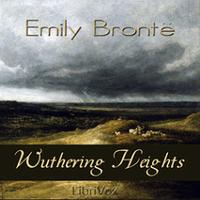Chapter32, Part 1
CHAPTER XXXII
1802.—This September I was invited to devastate the moors of a friend in the north, and on my journey to his abode, I unexpectedly came within fifteen miles of Gimmerton. The ostler at a roadside public-house was holding a pail of water to refresh my horses, when a cart of very green oats, newly reaped, passed by, and he remarked,—‘Yon's frough Gimmerton, nah! They're allas three wick' after other folk wi' ther harvest.' ‘Gimmerton?' I repeated—my residence in that locality had already grown dim and dreamy. ‘Ah! I know. How far is it from this?' ‘Happen fourteen mile o'er th' hills; and a rough road,' he answered. A sudden impulse seized me to visit Thrushcross Grange. It was scarcely noon, and I conceived that I might as well pass the night under my own roof as in an inn. Besides, I could spare a day easily to arrange matters with my landlord, and thus save myself the trouble of invading the neighbourhood again. Having rested awhile, I directed my servant to inquire the way to the village; and, with great fatigue to our beasts, we managed the distance in some three hours.
I left him there, and proceeded down the valley alone. The grey church looked greyer, and the lonely churchyard lonelier. I distinguished a moor-sheep cropping the short turf on the graves. It was sweet, warm weather—too warm for travelling; but the heat did not hinder me from enjoying the delightful scenery above and below: had I seen it nearer August, I'm sure it would have tempted me to waste a month among its solitudes. In winter nothing more dreary, in summer nothing more divine, than those glens shut in by hills, and those bluff, bold swells of heath.
I reached the Grange before sunset, and knocked for admittance; but the family had retreated into the back premises, I judged, by one thin, blue wreath, curling from the kitchen chimney, and they did not hear. I rode into the court. Under the porch, a girl of nine or ten sat knitting, and an old woman reclined on the housesteps, smoking a meditative pipe.
‘Is Mrs. Dean within?' I demanded of the dame.
‘Mistress Dean? Nay!' she answered, ‘she doesn't bide here: shoo's up at th' Heights.' ‘Are you the housekeeper, then?' I continued.
‘Eea, aw keep th' hause,' she replied. ‘Well, I'm Mr. Lockwood, the master. Are there any rooms to lodge me in, I wonder? I wish to stay all night.' ‘T' maister!' she cried in astonishment. ‘Whet, whoiver knew yah wur coming? Yah sud ha' send word. They's nowt norther dry nor mensful abaht t' place: nowt there isn't!' She threw down her pipe and bustled in, the girl followed, and I entered too; soon perceiving that her report was true, and, moreover, that I had almost upset her wits by my unwelcome apparition, I bade her be composed. I would go out for a walk; and, meantime she must try to prepare a corner of a sitting-room for me to sup in, and a bedroom to sleep in. No sweeping and dusting, only good fire and dry sheets were necessary. She seemed willing to do her best; though she thrust the hearth-brush into the grates in mistake for the poker, and malappropriated several other articles of her craft: but I retired, confiding in her energy for a resting-place against my return. Wuthering Heights was the goal of my proposed excursion. An afterthought brought me back, when I had quitted the court.
‘All well at the Heights?' I inquired of the woman.
‘Eea, f'r owt ee knaw!' she answered, skurrying away with a pan of hot cinders.
I would have asked why Mrs. Dean had deserted the Grange, but it was impossible to delay her at such a crisis, so I turned away and made my exit, rambling leisurely along, with the glow of a sinking sun behind, and the mild glory of a rising moon in front—one fading, and the other brightening—as I quitted the park, and climbed the stony by-road branching off to Mr. Heathcliff's dwelling. Before I arrived in sight of it, all that remained of day was a beamless amber light along the west: but I could see every pebble on the path, and every blade of grass, by that splendid moon. I had neither to climb the gate nor to knock—it yielded to my hand. That is an improvement, I thought. And I noticed another, by the aid of my nostrils; a fragrance of stocks and wallflowers wafted on the air from amongst the homely fruit-trees.
Both doors and lattices were open; and yet, as is usually the case in a coal-district, a fine red fire illumined the chimney: the comfort which the eye derives from it renders the extra heat endurable. But the house of Wuthering Heights is so large that the inmates have plenty of space for withdrawing out of its influence; and accordingly what inmates there were had stationed themselves not far from one of the windows. I could both see them and hear them talk before I entered, and looked and listened in consequence; being moved thereto by a mingled sense of curiosity and envy, that grew as I lingered.
‘Con-trary!' said a voice as sweet as a silver bell. ‘That for the third time, you dunce! I'm not going to tell you again. Recollect, or I'll pull your hair!' ‘Contrary, then,' answered another, in deep but softened tones. ‘And now, kiss me, for minding so well.' ‘No, read it over first correctly, without a single mistake.'

